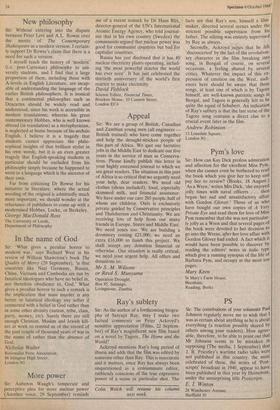New philosophy
Sir: Without entering into the dispute between Peter Levi and A.L. Rowse over the merits of The Contemporary Shakespeare as a modern version. I certain- ly support Dr Rowse's claim that there is a need for such a version.
I myself teach the history of 'modern' (i.e. post-Cartesian) philosophy to uni- versity students, and I find that a large proportion of them, including those with A-levels in English Literature, are incap- able of understanding the language of the earlier British philosophers. It is ironical that a continental philosopher such as Descartes should be widely read and understood, since his work is accessible in modern translations; whereas his great contemporary Hobbes, who is well known abroad (in translation) as a metaphysician, is neglected at home because of his archaic English. I believe it is a tragedy that students cannot appreciate the philo- sophical insights of that brilliant stylist in his own words; but it is an even greater tragedy that English-speaking students in particular should be excluded from his philosophy simply because he happened to write in a language which is the ancestor of their own.
Far from criticising Dr Rowse for his initiative in literature, where the actual wording of the original is admittedly much more important, we should wonder at the reluctance of publishers to come up with a modernised Hobbes, Locke, or Berkeley.
George MacDonald Ross
The University of Leeds. Department of Philosophy














































 Previous page
Previous page